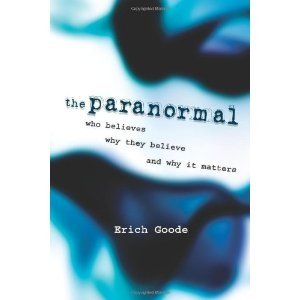The Paranormal by Erich Goode (book review).
Erich Goode’s book, ‘The Paranormal’, has the sub-title ‘Who Believes Why They Believe And Why It Matters’. The comma is missing on the cover but has two in the indice inside to make up for it. The title should give a clue as to the book’s subject matter.
Sensibly, Goode explains the scientific rationales of what paranormal is and why and then profounds the mix by being aware of people after death himself. Bearing in mind that Goode is also a sociology professor, I did wonder if he was straddling the fence somewhat. However, he does make the good point that just because something doesn’t appear to what it appears, does not mean it shouldn’t be examined to see just what is going on.
It’s interesting looking at his two page list of things people believe is possible in that he doesn’t bunch all ESP phenomenon together but separately, although this is done in the second part of the book. One could well believe that some people out there only believe that some aspects of ESP exist. Some things, like astronomy, make little sense. The position of the planets and stars being capable of predicting events in anyone’s life is akin to homeopathy where anything that is diluted to the point that there is nothing left can’t have anything left to work. Both, if anything, are an act of placebo but I’m getting away from the book as Goode spends a third of the book emphasising scientific principle. Goode’s own sensing of deceased people he knew could equally be a stirring of memory and the fact that it appears to be hereditary in his family could suggest something else is going on as well.
The middle section focuses on four sections of paranormal which should be familiar ground. What is more important is the final section and why scientists have such a hard slog convincing people – assuming they want to, which often they don’t – want to oppose any public opinion. Most of this is targeted at the American audience and how their media press go for sensational headlines than rebuttals after getting it wrong. Considering some legends, like the Bigfoot footage and even the ‘Surgeon’s Photograph’ of the Loch Ness Monster has kicked holes in the mythology, it’s interesting how Goode ignored those. Interestingly, he does point out that when Loch Ness was being deep-scanned there was something discovered but omits to point out that no one bothered to go back – as whatever it was had got behind the sonar scan – and find out just what it was and clear things up forever. Without that, there is always going to be some doubt as to what is there but definitely not an extinct plesiosaur but shows the vulnerability of scientists who are unwilling to damage their reputations.
I wish Goode’s information about what the American population believed in had been placed in a box of statistics than within text because it would have helped in making comparisons. Something he ignored about this is the biggest common denominator: religion. As long as Americans see themselves as ‘God-fearing’, it’s no wonder science is increasingly coming off as second best to the general population. Even more worrying is that the USA also regards itself as being advanced. Ever got the feeling of the snail in the slippery pipe climbing three feet and dropping four feet the next night? Although I think Goode could have gone a lot further and even address the situation in other parts of the world as comparison, this section needs a serious read by everyone.
In many respects, humans haven’t changed much over the centuries. If anything, it is the failure of scientists in standing their ground, not just with evolution against creationism, but in destroying myths with undeniable facts that the general population can understand but then it would also destroy the power of many religions over their flocks and no one person wants to be responsible for that. I’m not entirely sure if I go along with Goode where he says that our genre feeds the mythology as, I hope, many of us reading here can tell the difference and treats Science Fiction as possibilities speculation. His arguments for existing conspiracies does indicate that there is some fire behind things. As to keeping things hidden and saying it can’t happen, in my opinion, can happen or how else could Area 51 keep their stealth planes hidden as UFOs for so long?
The fact that I’m reacting so much should mean that there is plenty here for you to have a ponder on. It’s a shame really that the potential target audience, those with deep religious beliefs, that should read this book and might benefit from it, probably won’t. Those with an interest in the paranormal might know a lot of this but many are also sceptics themselves, just seeking out the real from the fake. How you will take the book, you’ll have to decide after reading.
GF Willmetts
(pub: Prometheus Books. 335 page indexed enlarged paperback. Price: $19.00 (US). ISBN: 978-1-61614-491-3)
check out websites: www.prometheusbooks.com







